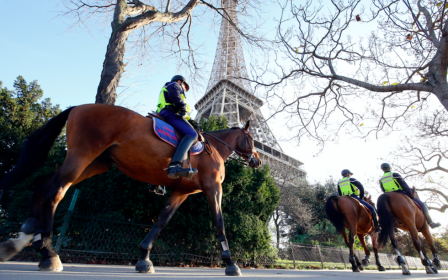Brussels denies capture of Paris attack suspect following raids

The Brussels' prosecutors office has denied reports that one of those allegedly responsible for Friday's massacre in Paris had been arrested in the Brussels district of Molenbeek, following raids on Monday morning.
Salah Abdeslam fled the scene on Friday following six separate attacks across Paris which left at least 132 people dead. An international arrest warrant was issued following his flight.
Over 100 officers were reportedly at the scene in Molenbeek, with raids continuing throughout the morning. Robots were reportedly searching two cars in the district for signs of explosives.
French media also reported there had been arrests in Grenoble, in southeastern France, where firearms and cash were discovered by police while raids were also carried out in Jeumont, Toulouse and in Bobigny.
Molenbeek has been described as "Europe's jihadi central," and a number of attacks have been linked to the suburb.
On Sunday, Belgian Prime Minister Charles Michel warned there would be a need to be "repressive" against Molenbeek following the failure of integration.
“Almost every time there’s a link with Molenbeek," he said, referring to the attack.
“We’ve tried prevention. Now we’ll have to get repressive. It’s been a form of laissez faire and laxity. Now we’re paying the bill.”
Molenbeek's deputy mayor, however, said that much of the borough's reputation was unfair.
“Molenbeek has always been a transit community,” Ahmed El Khannouss told the Guardian. “I know everyone thinks it’s a base for radicals and terrorists, but a lot of that is stigmatisation.”
“It’s extremely dangerous to link these radicals with the local population.”
Raffaello Pantucci, director of International Security Studies at the Royal United Services Institute, told Middle East Eye that the raids by the French and Belgian police were likely to be broad in scope and put any IS suspects on the backfoot.
"Clearly they’re dealing with a network that already knew about, so they’re just stamping down heavily on them, trying to pick up all the pieces," he said.
"I think that you’re more likely to now see people scarpering, probably back to Syria and Iraq, than you are trying to launch attacks."
"Unless there’s some pretty major slip-ups they’re going to try and sweep up as much of the network as they can now and then figure out exactly who they’ve caught."
Stay informed with MEE's newsletters
Sign up to get the latest alerts, insights and analysis, starting with Turkey Unpacked
Middle East Eye delivers independent and unrivalled coverage and analysis of the Middle East, North Africa and beyond. To learn more about republishing this content and the associated fees, please fill out this form. More about MEE can be found here.




